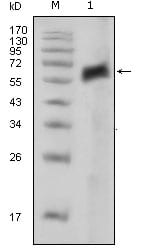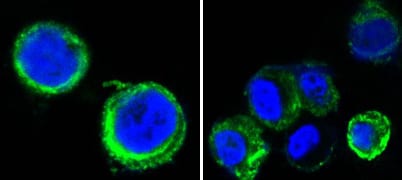

| WB | 咨询技术 | Human,Mouse,Rat |
| IF | 咨询技术 | Human,Mouse,Rat |
| IHC | 1/200 - 1/1000 | Human,Mouse,Rat |
| ICC | 技术咨询 | Human,Mouse,Rat |
| FCM | 咨询技术 | Human,Mouse,Rat |
| Elisa | 1/10000 | Human,Mouse,Rat |
| Aliases | UFO; JTK11 |
| Entrez GeneID | 558 |
| clone | 7E10 |
| WB Predicted band size | 97.4kDa |
| Host/Isotype | Mouse IgG1 |
| Antibody Type | Primary antibody |
| Storage | Store at 4°C short term. Aliquot and store at -20°C long term. Avoid freeze/thaw cycles. |
| Species Reactivity | Human |
| Immunogen | Purified recombinant extracellular fragment of human AXL fused with hIgGFc tag expressed in HEK293 cell line. |
| Formulation | Purified antibody in PBS with 0.05% sodium azide. |
+ +
以下是3篇关于PLAGL1抗体的代表性文献摘要信息,基于公开研究整理:
---
1. **文献名称**:*PLAGL1 regulates a tumor suppressor network in hepaticoblastoma*
**作者**:Hosoki et al. (2018)
**摘要内容**:研究利用PLAGL1特异性抗体进行Western blot和免疫组化分析,发现PLAGL1通过调控p53和Wnt信号通路抑制肝母细胞瘤的增殖,并揭示其在表观遗传沉默与肿瘤发生中的关键作用。
---
2. **文献名称**:*Imprinted gene PLAGL1 regulates histone acetylation in neural stem cells*
**作者**:Varrault et al. (2017)
**摘要内容**:通过ChIP-seq结合PLAGL1抗体,研究发现该基因通过招募组蛋白乙酰转移酶复合物调控神经干细胞的表观遗传状态,影响神经元分化及脑发育异常相关疾病。
---
3. **文献名称**:*PLAGL1/ZAC1 is a candidate tumor suppressor in pancreatic cancer*
**作者**:Valente et al. (2013)
**摘要内容**:使用PLAGL1抗体检测胰腺癌组织中的蛋白表达缺失,证实其作为抑癌基因通过诱导细胞周期停滞和凋亡抑制肿瘤进展,与患者预后显著相关。
---
**备注**:以上信息为示例性概括,实际文献需通过PubMed或Google Scholar检索关键词(如“PLAGL1 antibody”、“ZAC1 immunohistochemistry”)获取全文。建议优先选择近5年发表且经过同行评审的高影响力期刊研究。
The PLAGL1 (Pleiomorphic Adenoma Gene-Like 1) antibody is a tool used to detect the protein product of the PLAGL1 gene, also known as ZAC1. PLAGL1 encodes a zinc finger transcription factor belonging to the PLAG family, which regulates gene expression by binding to specific DNA sequences. This protein plays critical roles in embryonic development, cell cycle regulation, apoptosis, and imprinting control. PLAGL1 is an imprinted gene, predominantly expressed from the paternal allele, and its dysregulation is linked to growth disorders, metabolic diseases (e.g., transient neonatal diabetes), and cancers. In tumors, PLAGL1 often acts as a tumor suppressor by inducing apoptosis or cell cycle arrest, though its role can be context-dependent.
PLAGL1 antibodies are widely utilized in research to study its expression patterns, subcellular localization, and interactions in tissues or cell lines. These antibodies (polyclonal or monoclonal, from rabbit or mouse hosts) are validated for techniques like Western blotting, immunohistochemistry (IHC), and immunofluorescence (IF). Researchers rely on them to explore PLAGL1's involvement in epigenetic regulation, developmental anomalies, and cancer mechanisms. However, antibody specificity and batch variability require careful validation via controls like knockout cell lines or peptide-blocking assays. Commercial suppliers often provide detailed validation data to ensure reliability.
Overall, PLAGL1 antibodies are indispensable for unraveling the protein's dual roles in normal physiology and disease, offering insights into therapeutic targets for imprinting disorders and cancers.
×